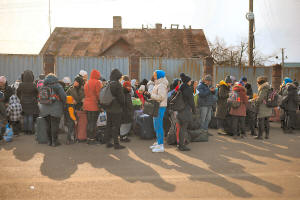Ukrainians face long journeys to borders as fighting escalates
 Send a link to a friend
Send a link to a friend
 [March 01, 2022]
By Krisztina Than and Alicja Ptak [March 01, 2022]
By Krisztina Than and Alicja Ptak
TISZABECS, Hungary/MEDYKA, Poland (Reuters)
- Ukrainians arriving into the European Union on Tuesday described their
frantic journeys to the border after leaving behind husbands and fathers
to fight a Russian invasion and escaping their homes to the sound of
shelling.
As a massive Russian convoy rumbles toward the Ukrainian capital Kyiv,
the United Nations said more than 500,000 refugees had fled to
neighbouring countries since Russian President Vladimir Putin launched
what he has called "a special military operation" last Thursday.
[L1N2V408B]
At the Hungarian border crossing Tiszabecs, a young mother cradled a
baby in her arms as she and her son recounted watching rockets stream
through the air before they drove for four days from the capital Kyiv.
"I saw war, I saw rockets," said 15-year-old Ivan, who looked exhausted
and pale after the journey. The family, whose father stayed behind to
fight, travelled in two cars carrying Ivan's three sisters, two aunts
and grandmother.
New arrivals continued to pour across central European border crossings,
with news of fierce fighting, civilian deaths and the massive Russian
convoy stoking worries of those fleeing the war.

Across central Europe, authorities set up makeshift reception centres in
tents where people could get medical aid and process asylum papers,
while thousands of volunteers have driven to the borders with donations
of food, blankets and clothes.
Most of the refugees escaping the war have crossed into the European
Union from borders in eastern Poland, Slovakia and Hungary and in
northern and northeastern Romania.
Poland, whose Ukrainian community of around 1 million is the region's
largest, has welcomed a big chunk of the arrivals. The Polish Border
Guard said that over 377,400 people had so far entered from Ukraine ,
with around 24,000 arriving on Tuesday since 7 a.m. local time.
At the Medyka crossing, Poland's busiest along its roughly 500-kilometre
(310 miles) border with Ukraine, people huddled around a bonfire in
freezing temperatures as they waited for buses to take them to reception
centres. Discarded bottles, clothes and other items littered the road,
and a few hundred people gathered near a local grocery store.
[to top of second column]
|

People who have fled Russia's invasion of Ukraine wait at the
Shehyni border crossing to enter Poland, near Mostyska, Ukraine
March 1, 2022. REUTERS/Thomas Peter
 Also at the crossing was Ibrahima
Sory Keita, who had arrived in Meliptopol three weeks ago from
Guinea to begin studies.
Cities under siege across Ukraine are home to tens of thousands of
African students studying medicine, engineering and military
affairs. Thousands of Indian students are also trying to flee.
Keita and a few friends raced to the border when fighting broke out,
walking the final 45 kilometres on foot.
"Everything hurts right now," he said after crossing the border. "I
haven't had a chance to lie down for 4 days. I am shaking (from
cold) and I need to sleep in a warm place."
Some refugees were met by family members already working in the
European Union who waited at the many border crossings, while local
residents and officials across the region offered apartments and set
up reception centres for temporary lodging.
Hungarian police reported that more than 60,000 people have arrived
in the country since the Russian invasion while nearly 90,000 have
entered Romania.
At some border crossing, queues on the Ukrainian side stretched back
for kilometres.
At the Budapest train station a newly-arrived Ukrainian man in his
60s met by volunteer workers worried about his sons who stayed
behind in Kyiv and wondered whether he would ever return to his
home.
"I think this war will be very long in time," said Amir, who did not
want to give his last name. "I left my house, my car, all of my
profit in my life, I left all. We have nothing now."
(Additional reporting by Krisztina Fenyo in Budapest, Luiza Ilie and
Octav Ganea in Bucharest; Writing by Michael Kahn; Editing by Raissa
Kasolowsky)
[© 2022 Thomson Reuters. All rights
reserved.] This material may not be published,
broadcast, rewritten or redistributed.
Thompson Reuters is solely responsible for this content.
 |